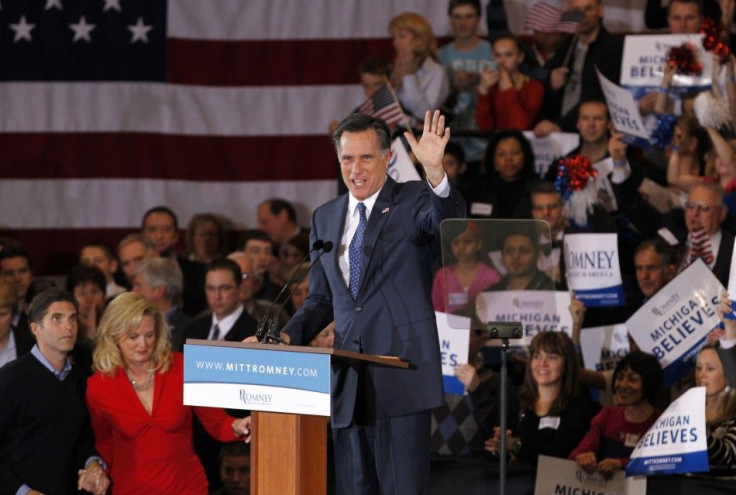Mitt Romney Sweeps Double Win in Michigan and Arizona

(Reuters) - Republican presidential candidate Mitt Romney avoided a humiliating defeat in the state where he grew up on Tuesday as he edged rival Rick Santorum in a bitterly fought Michigan primary.
Romney also rolled to an easy victory in Arizona, but all eyes were on Michigan, the Rust Belt state that posed a crucial test for the putative Republican front-runner.
Television networks called the race for Romney about an hour and a half after polls closed. With 91 percent of precincts reporting, Romney led Santorum by 41 percent to 38 percent. Texas Congressman Ron Paul trailed with 12 percent of the vote and former House of Representatives Speaker Newt Gingrich got 7 percent.
We didn't win by a lot, but we won by enough and that's all that counts, Romney told cheering supporters.
Romney's twin victories give him fresh momentum heading into Super Tuesday next week, when 10 states across the country hold presidential nominating contests.
A defeat in Michigan, where his father was a popular governor , would have raised more questions about Romney's ability to appeal to conservatives and blue-collar voters in the state-by-state battle to take on Democratic President Barack Obama in the November 6 general election.
As they have in other states, those voters chose somebody other than Romney, a former private equity executive who compiled a centrist record as governor of Massachusetts.
But a strong debate performance and an economy-first message helped Romney seize the momentum from Santorum, who has led in nationwide opinion polls since winning state contests in Missouri, Minnesota and Colorado.
Romney at times played into voter perceptions that he is out of touch with the concerns of ordinary voters in a state that has been hit especially hard by recession and foreclosure.
He told Michigan voters that his wife drove two Cadillacs and mentioned that while he did not follow stock-car racing closely he was friends with several team owners. Democrats have hammered him for his opposition to the 2008-2009 government bailout of the domestic auto industry, which is centered in Detroit.
CONSERVATIVE CREDENTIALS
Santorum, a former U.S. senator from Pennsylvania, emphasized his staunch opposition to abortion and gay marriage as he courted Christian conservatives in the western half of the state.
A month ago, they didn't know who we are. They do now, he told supporters.
Santorum had appealed to Democrats to back him in the primary, which was open to voters of all parties - a tactic that Romney denounced as dirty tricks.
Exit polls showed that Democrats made up about 9 percent of those voting, roughly in line with primaries in earlier years. Santorum carried 53 percent of those voters.
Santorum carried the most conservative voters, those who said that the religious views of candidates were important, and those who were less affluent and less educated.
Romney won voters who had college degrees and those who earned more than $100,000 a year. Voters who placed a premium on electability backed Romney as well.
We talk about who can run a government and who has business experience and I think he had the qualifications, said Bobbie Portelli, a retired nurse from Novi who voted for Romney.
Throughout the ups and downs of the race, Romney aides have insisted that they are focused on securing the 1,144 delegates needed to win the nomination. Romney was set to widen his lead over his rivals there, as Arizona awards its 29 delegates on a winner-take-all basis and Michigan awards its 30 delegates proportionally.
With new rules that hand out more delegates on a proportional basis, many observers expect the nomination may not be decided until June.
Republican leaders worry that an extended, acrimonious primary battle will damage the eventual nominee, and Romney's approval ratings have fallen as the race has heated up.
© Copyright Thomson Reuters 2024. All rights reserved.




















